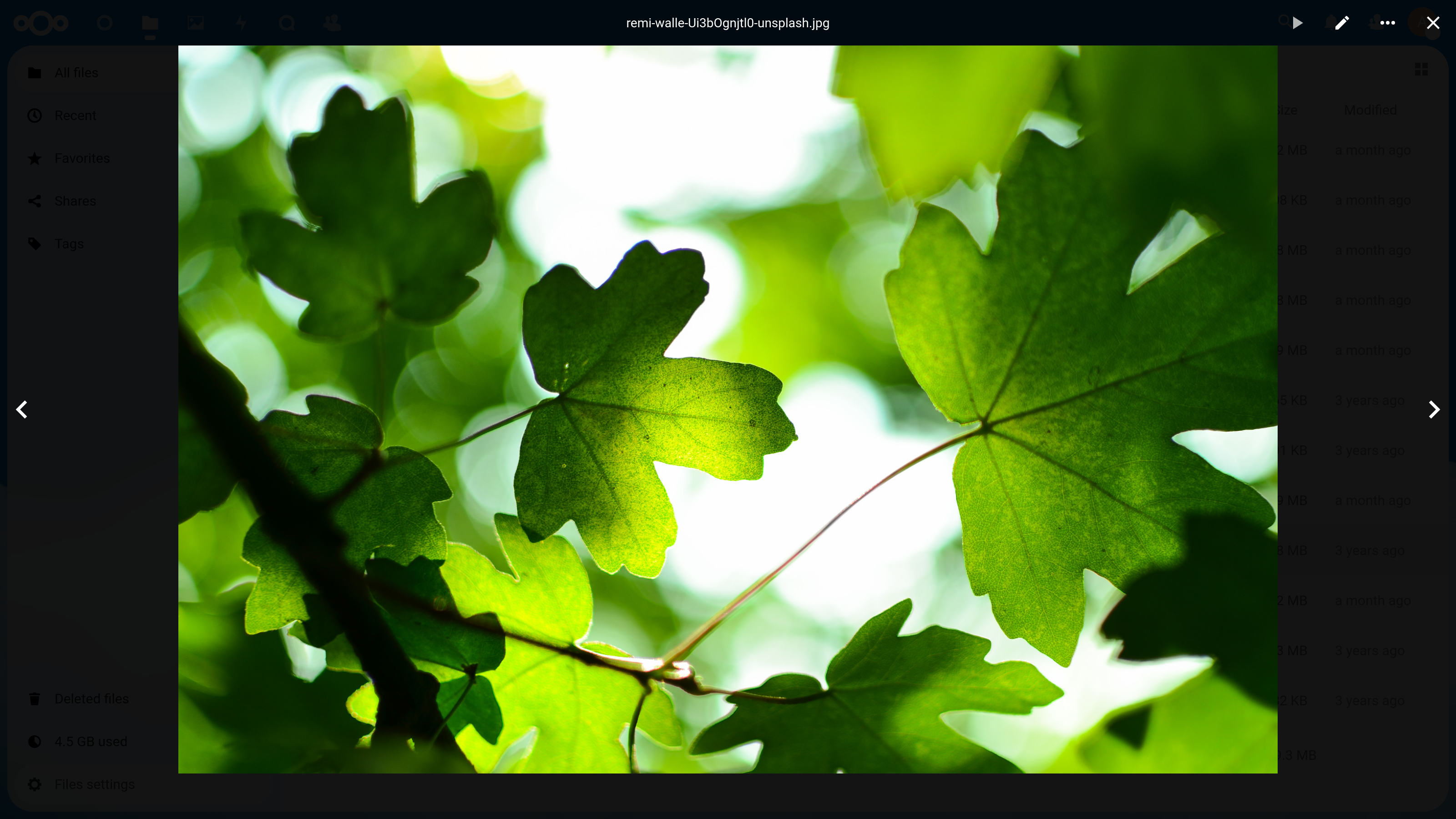https://github.com/nextcloud/viewer
🖼 Simple file viewer with slideshow for media
https://github.com/nextcloud/viewer
fileinfo hacktoberfest javascript media nextcloud nextcloud-app photo-gallery photos videos viewer vue vuejs
Last synced: 10 months ago
JSON representation
🖼 Simple file viewer with slideshow for media
- Host: GitHub
- URL: https://github.com/nextcloud/viewer
- Owner: nextcloud
- License: agpl-3.0
- Created: 2019-02-19T19:28:31.000Z (almost 7 years ago)
- Default Branch: master
- Last Pushed: 2025-03-27T02:09:10.000Z (11 months ago)
- Last Synced: 2025-03-28T12:05:42.901Z (11 months ago)
- Topics: fileinfo, hacktoberfest, javascript, media, nextcloud, nextcloud-app, photo-gallery, photos, videos, viewer, vue, vuejs
- Language: JavaScript
- Size: 506 MB
- Stars: 103
- Watchers: 12
- Forks: 56
- Open Issues: 113
-
Metadata Files:
- Readme: README.md
- Funding: .github/FUNDING.yml
- License: COPYING
- Codeowners: .github/CODEOWNERS
- Authors: AUTHORS.md
Awesome Lists containing this project
README
# Files viewer for nextcloud
[](https://api.reuse.software/info/github.com/nextcloud/viewer)
Show your latest holiday photos and videos like in the movies. Show a glimpse of your latest novel directly from your nextcloud. Choose the best GIF of your collection thanks to the direct view of your favorites files!

## 📋 Current support
- Images
- Videos
## 🏗 Development setup
1. ☁ Clone this app into the `apps` folder of your Nextcloud: `git clone https://github.com/nextcloud/viewer.git`
2. 👩💻 In the folder of the app, install dependencies with `npm ci` and build the Javascript with `npm run build`.
3. 🎉 Partytime!
### 🧙 Advanced development stuff
To build the Javascript whenever you make changes, you can also run `npm run dev` for development builds.
### 📷 Running cypress tests
To run e2e cypress tests, execute `npm run cypress`.
The `visual-regression` tests require additional care as they depend on installation of fonts in the application. To achieve repeatable results run the tests using `npm run cypress:visual-regression`. This will build the app with the required fonts and run the tests.
If changes are required to the reference (base) screenshots used by the `visual-regression` tests, run `cypress:update-snapshots` and commit the updated screenshots.
## API
### Add the viewer to your app
In php, on your page, emit the LoadViewer event.
Check the documentation/tutorial for more info on this type of page controller sample.
``` php
use OCA\Viewer\Event\LoadViewer;
use OCP\AppFramework\Controller;
use OCP\AppFramework\Http\TemplateResponse;
use OCP\EventDispatcher\IEventDispatcher;
use OCP\IRequest;
class PageController extends Controller {
protected $appName;
/** @var IEventDispatcher */
private $eventDispatcher;
public function __construct($appName,
IRequest $request,
IEventDispatcher $eventDispatcher) {
parent::__construct($appName, $request);
$this->appName = $appName;
$this->eventDispatcher = $eventDispatcher;
}
/**
* @NoAdminRequired
* @NoCSRFRequired
* Render default index template
*
* @return TemplateResponse
*/
public function index(): TemplateResponse {
$this->eventDispatcher->dispatch(LoadViewer::class, new LoadViewer());
$response = new TemplateResponse($this->appName, 'main');
return $response;
}
}
```
This will load all the necessary scripts and make the Viewer accessible trough javascript at `OCA.Viewer`
### Open a file
1. Open a file on WebDAV and let the viewer fetch the folder data
```js
OCA.Viewer.open({path: '/path/to/file.jpg'})
```
2. Open a file on WebDAV and provide a list of files
```js
OCA.Viewer.open({
path: '/path/to/file.jpg',
list: [
{
basename: 'file.jpg',
filename: '/path/to/file.jpg',
...
},
...
],
})
// Alternative: pass known file info so it doesn't need to be fetched
const fileInfo = {
filename: '/path/to/file.jpg',
basename: 'file.jpg',
mime: 'image/jpeg',
etag: 'xyz987',
hasPreview: true,
fileid: 13579,
}
OCA.Viewer.open({
fileinfo: fileInfo,
list: [fileInfo],
})
```
The list parameter requires an array of fileinfo. You can check how we generate a fileinfo object [here](https://github.com/nextcloud/viewer/blob/master/src/utils/fileUtils.js#L97) from a dav PROPFIND request data. There is currently no dedicated package for it, but this is coming. You can check the [photos](https://github.com/nextcloud/photos) repository where we also use it.
3. Open a file from an app's route
```js
const fileInfo1 = {
filename: 'https://next.cloud/apps/pizza/topping/pineapple.jpg',
basename: 'pineapple.jpg',
source: 'https://next.cloud/apps/pizza/topping/pineapple.jpg',
mime: 'image/jpeg',
etag: 'abc123',
hasPreview: false,
fileid: 12345,
}
const fileInfo2 = {
filename: 'https://next.cloud/apps/pizza/topping/garlic.jpg',
basename: 'garlic.jpg',
source: 'https://next.cloud/apps/pizza/topping/garlic.jpg',
mime: 'image/jpeg',
etag: 'def456',
hasPreview: false,
fileid: 67890,
}
OCA.Viewer.open({
fileInfo: fileInfo1,
list: [fileInfo1, fileInfo2],
})
```
In order to open a shared file you will need to provide the share token
so the Viewer can use it to authenticate the requests to the server.
See the `files_sharing` app
[controller](https://github.com/nextcloud/server/blob/master/apps/files_sharing/lib/Controller/ShareController.php#L404)
and
[template](https://github.com/nextcloud/server/blob/master/apps/files_sharing/templates/public.php#L18)
for an example.
### Close the viewer
```js
OCA.Viewer.close()
```
### 🔍 Add you own file view
If you want to make your app compatible with this app, you can use the `OCA.Viewer` methods
1. Create a vue component which use the `path` and `mime` props (they will be automatically passed by the viewer)
2. Register your mime viewer with the following:
``` js
import VideoView from 'VideoView.vue'
OCA.Viewer.registerHandler({
// unique id
id: 'video',
// optional, it will group every view of this group and
// use the proper view when building the file list
// of the slideshow.
// e.g. you open an image/jpeg that have the `media` group
// you will be able to see the video/mpeg from the `video` handler
// files that also have the `media` group set.
group: 'media',
// the list of mimes your component is able to display
mimes: [
'video/mpeg',
'video/ogg',
'video/webm',
'video/mp4'
],
// your vue component view
component: VideoView
})
```
3. if you feel like your mime should be integrated on this repo, you can also create a pull request with your object on the `models` directory and the view on the `components` directory. Please have a look at what's already here and take example of it. 🙇♀️